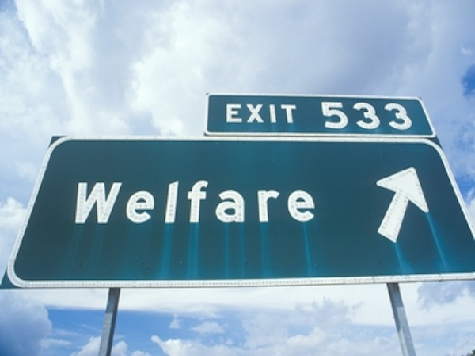
Robert Rector, who played a major role in crafting the 1996 Welfare Reform Act which Bill Clinton signed after having vetoed it twice, debunked Clinton’s claim Wednesday night that Obama actually changed the welfare law to require more work.
This is the second major instance — the first was when liberal and mainstream media fact-checkers failed to call out the Obama administration for having asserted they had not made any changes to the welfare law when they did — when a liberal has told a falsehood about welfare and received a complete pass.
Rector wrote the Obama administration “will put in mothballs the formal purpose of welfare reform–to reduce the number of people dependent on government benefits” and will “abandon the legislative performance goal that encourages states to reduce welfare caseloads.”
“It will weaken the ‘work participation’ standards that require some 30 percent of able-bodied Temporary Assistance for Needy Families (TANF) recipients to engage in work activities for 20 to 30 hours per week,” Rector wrote.
Clinton, whose signature welfare reform law the Obama administration recently gutted, on Thursday night told the nation that Obama actually changed the law to require more work.
Dogged fact-checkers, who have obsessed over every word Republicans have uttered throughout the election cycle, gave Clinton a pass like they did Obama when he claimed his administration made no changes to the welfare law.
On Tuesday, the Government Accounting Office (GAO) determined Obama did make changes to the welfare law and thus should give Congress an opportunity to block the changes.
Again, the mainstream media was silent, as were the “fact-checkers” the GAO overruled.
And still, Clinton, who lied to the American people about his “relations” with Monica Lewinsky and tried to make up new definitions for what the word “is” meant, tried to spin the country on Obama’s changes to the welfare law.
“The claim that President Obama weakened welfare reform’s work requirement is just not true,” Clinton said.
Clinton said “when some Republican governors asked to try new ways to put people on welfare back to work, the Obama administration listened, because we all know it’s hard for people to get jobs today, so moving people to work is a real challenge.”
As Rector notes, though, Clinton’s claims were based on the Obama administration’s assertion that states will be exempted from work “participation rate requirements” if they raise the number of individuals leaving welfare for work by 20 percent. This is referred to as “employment exits.”
But, far from what Clinton claimed, the employment exits performance measure is a meaningless measure of the success in welfare reform.
“As caseloads increase, the number of employment exits increases,” Rector writes. “As caseloads fall, the number of employment exits falls. Thus Obama’s new performance goal (increases in employment exits) is positively correlated with increases in welfare caseloads and negatively correlated with actual reductions in welfare dependence.”
In essence, Obama’s changes to the welfare law would have deemed Clinton’s Welfare Reform Act a failure because “fewer people were going on welfare in the first place — caseloads plummeted, and employment exists declined.” By the same measure, Obama’s changes would have determined that the welfare policy prior to the Welfare Reform Act was a success because caseloads soared and, as a result, employment exist nearly doubled.
Rector notes “universal engagement” can be a positive if used in conjunction with existing work requirement standards. However, that is not what the Obama administration is proposing when it asserts that states should use universal engagement “in lieu of” the work requirements in the current welfare law.

COMMENTS
Please let us know if you're having issues with commenting.